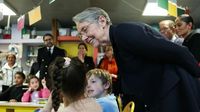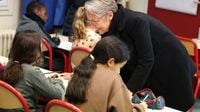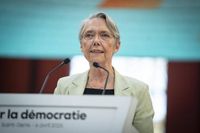Élisabeth Borne, France's Minister of National Education, has sparked a debate about the early orientation of students in their educational journeys. On Monday, April 7, 2025, during an appearance on LCP, she suggested that children should begin contemplating their future educational paths almost from kindergarten. "We must prepare very young, almost from the start, to reflect on how they project themselves into a training and a job tomorrow," Borne stated, emphasizing the need for early guidance in professional orientation.
Borne's comments come amid ongoing discussions about the national higher education enrollment platform, Parcoursup, which has faced criticism for its approach to student orientation. She highlighted that nearly one million students are registered on Parcoursup, with around 200,000 of them undergoing reorientation after the baccalaureate. This statistic underlines the challenges many students face when making educational choices later in their academic careers.
Her remarks were in stark contrast to those of Prime Minister François Bayrou, who recently expressed skepticism about the platform. He described the early orientation it mandates as often leading to "social orientation" for students, suggesting that not all children develop at the same pace. Borne, however, defended the idea of early preparation, arguing that it is crucial to address the overall issue of orientation much earlier than the moment students fill out their Parcoursup applications.
During her discussion, Borne referenced the situation of girls in mathematics, noting that while girls and boys start school with similar interests in math, a significant gap emerges by the end of the first trimester, which continues to widen throughout their education. "Today, the taste of girls for mathematics at the start of first grade is the same as that of boys. After a term, there is a gap that worsens throughout schooling," she explained. This observation underscores her concern about gender biases in education and the need to support all students equally from a young age.
Despite the initial enthusiasm surrounding her comments, Borne faced criticism and mockery on social media, prompting her to clarify her position the following day. On April 8, she took to the platform X (formerly Twitter) to assert, "No! We are not going to orient students from kindergarten!" She stressed that the goal should be to ensure that students are not conditioned in their orientation choices, particularly regarding gender differences.
Her entourage further explained that Borne's intent was not to impose early career decisions on children but rather to foster an environment where young students can explore their abilities and build confidence. This approach aims to help them make informed choices later in their educational paths, rather than feeling pressured to decide their futures prematurely.
The debate surrounding early educational orientation is not new in France. It has been a topic of contention for years, especially during electoral campaigns. Emmanuel Macron, during his presidency, had previously advocated for introducing vocational training and orientation starting in the fifth grade, a stance that Borne has now seemingly shifted away from.
As Borne prepares to present an action plan regarding educational reforms in the coming months, her comments highlight a significant shift in the conversation about how and when students should be guided in their educational choices. While the idea of early orientation may resonate with some, it raises critical questions about the balance between guidance and pressure in children's formative years.
In a broader context, the issue of educational orientation reflects societal attitudes towards career paths and the expectations placed on young people. As France grapples with these challenges, Borne's insights may shape the future of educational policy and how it addresses the needs of diverse student populations.
Ultimately, the conversation around early orientation will likely continue to evolve, particularly as Borne and her team work on their proposed reforms. The emphasis on supporting students in discovering their capabilities and fostering a love for learning is a crucial step in ensuring that all children, regardless of gender or background, have equal opportunities to succeed.






